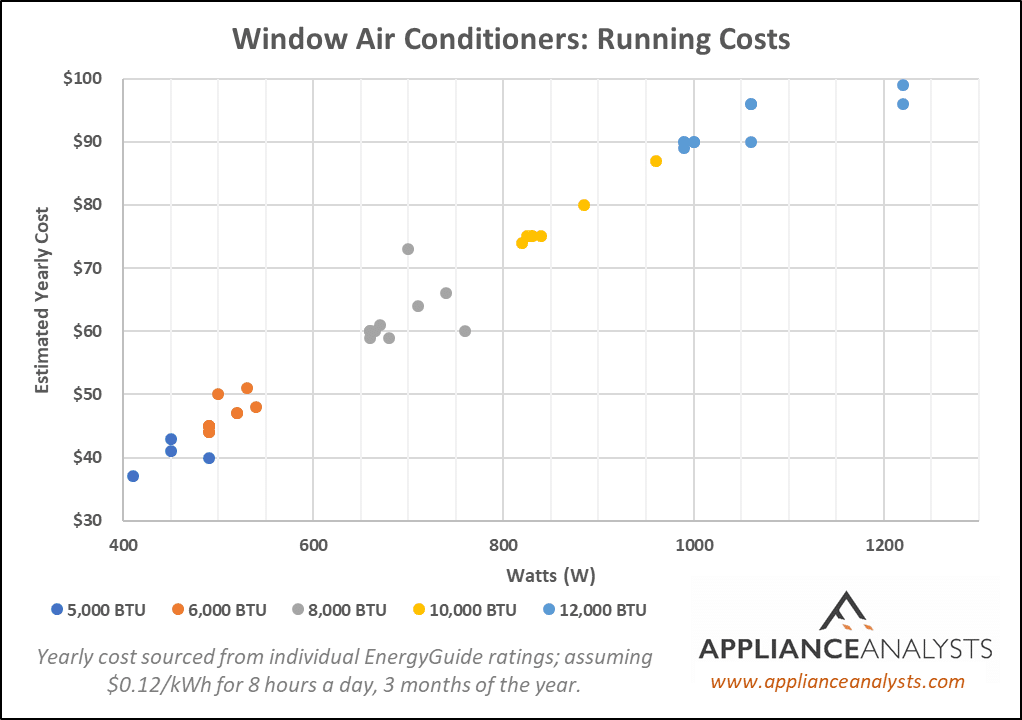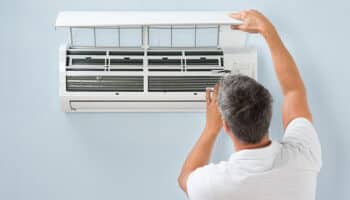We've independently reviewed this article to make sure it's as accurate as we can make it.
To find out more about our article creation and review process, check out our editorial guidelines.
With the average US Household spending over $2,000 on energy bills, we want to make sure we’re getting the most out of our heating and cooling systems.
Window air conditioners are a great, cost-efficient way to cool a central living space. But how much will it cost you to run one?
On average, you a window air conditioner costs between $40 and $100 per year to run. This mostly depends on the aircon’s power (in BTU) and wattage. The air conditioner running cost also depends on how efficiently the ac is used, and the cooling demand placed on it. See our calculator for more.
In my research to answer this question, I studied the running costs of over 40 window air conditioners. Below are the results.
| Power | Ave. Watts | Yearly Cost | Reviewed |
| 5,000 BTU | 450W | $41 | 4 |
| 6,000 BTU | 505W | $47 | 11 |
| 8,000 BTU | 690W | $62 | 11 |
| 10,000 BTU | 855W | $78 | 7 |
| 12,000 BTU | 1060W | $93 | 10 |
For a better idea, here’s a graph showing the data:

Data sourced from EnergyGuide ratings for 43 unique window air conditioners, based on an example case of 8 hours a day, at $0.12 per kWh, for 3 months of the year.
Even though I can only show data and averages on this article, I’ve also created a calculator to give you a way to gauge any window air conditioner you’re considering.
It’s basic. But by estimating your air conditioner’s power and hours of use, we can estimate how much energy that actual model may use.
Want to validate the calculator? Check it against the EnergyGuide estimates above!
Click here to find out the cost of electricity in your state.
What Factors Affect Your Electricity Usage?
The reason it’s so tricky to give you an exact cost is the different factors that affect your final energy bill.
By understanding these factors, we can better understand how to save on costs.
As well as your specific rate per unit of electricity, there’s four things that determine how much power your air conditioner uses:
- Outdoor Temperature. Trying to make a room 68o while it’s 75o out is no problem. Trying to keep a room at 68o while it’s 90o out? Big problem.
- Indoor Temperature. Secondary to what the sun’s doing is your starting indoor temperature. If your space is naturally shaded and cool you’ll need much less power than if it’s roasting and in direct sunlight.
- Insulation. This is the big one – but also the most overlooked. Insulation is massive when it comes to separating the air-conditioned temperature of your space to the temperature outside. More insulation means less energy needed to keep your temperature low.
- AC Effectiveness. Finally, we have the air conditioner itself. How effective it is relies upon:
- Power. The BTU rating of your AC means faster cooling, usually at the cost of more energy.
- Condition. Everything suffers from wear and tear – including air conditioners. There’s a big difference between clogged filters, dirty coils, and leaking refrigerants, versus a clean window air conditioner’s efficiency.
- Efficiency. Measured via an EER rating, how well your air conditioner turns pure electricity into cooling power. This is where modern units really save on running costs.
Understanding Watts vs Actual Use

Among all the other factors, the reason air conditioners are hard to manage is that the amount of power they use varies a lot.
When your air conditioner is cooling your room at max power, it’s using a ton of electricity. When it’s oscillating on and off to maintain the temperature? It’s uses much less. Chris from ServiceTradePros.com, a State-Certified Electrician in Naples Florida, notes that its best to ensure that your Window AC Unit is plugged into a 20amp circuit, as opposed to a 15amp circuit.
This will lessen the strain on your circuit breaker and ensure your Window AC unit is running as efficiently as possible. This is especially true if you’re running one of the larger (12,000 and over) BTU units.
This is where Watts and Usage come in.
Wattage is how much electricity the AC uses at maximum power. But it doesn’t tell us how much it uses to maintain temperature.
For example:
A 900W AC uses less electricity per hour than a 1000W AC, right?
But a 1000W AC might cool your room in 20 minutes, while a 900W takes 30 minutes.
And they may both use the same average of 400W to keep your room at that cool temperature.
Gets tricky pretty quick, doesn’t it!
I’ve tried a lot of ways to try and measure the exact usage, but in the end everything is so variable. The only way to know is to run the air conditioner in your own space.
That said, there’s plenty of ways to help your AC’s efficiency..
How to Improve Your Window Air Conditioner
On top of buying an efficient model, there’s a few actions you can take to really get the most out of any model.
Here’s a few of the best ways to improve the performance of a window ac:
- Insulate! By far, the absolute #1 impact on heating and cooling costs is insulation. The more you have, the less you’ll pay in bills.
- Up the temperature. Every degree of increase will help save on cooling costs. Try to play around with warmer ranges if you can.
- Let it flow. Avoid having anything in-front of or around the air conditioner. Keeps the drapes well open, and even if it’s not a modern art piece, don’t try to block it with furniture!
- Change or clean your filters. Around once monthly will help.
- Keep it on the DL. Air conditioners use the most energy when reducing temperature, not maintaining it. If you’re only leaving the house for an hour or two, it can be better to leave it running (with a higher temperature set), than turn it off entirely.
For more tips, see our full 21-tip list of tips to Get The Most Out Of Your Air Conditioner.
Can You EER The Savings?
Efficiency is one of the first things to look for if you’re looking to find a window air conditioner that won’t skyrocket your energy bills. Thankfully, you only need to pay attention to a simple number rating: CEER.
CEER stands for Combined Energy Efficiency Ratio.
CEER is used for window air conditioners while SEER (Seasonal EER) is used for central ac units. EER on its own is mostly outdated now. It’s important to only compare like and like – because they all measure different things.
The higher the rating, the better the efficiency. The better the efficiency, the less you’ll pay for the same amount of cooling.
For reference, below are the minimum efficiency ratings advised by the Department of Energy for window air conditioners:
| ELECTRICALLY OPERATED ROOM AIR CONDITIONERS: MINIMUM EFFICIENCY REQUIREMENTS | ||
| Equipment Type | Size Category (Input) | Minimum Efficiency |
| Room air conditioners with louvered sides | <6,000 Btu/h | 12.1 CEER |
| ≥6,000 Btu/h and <8,000 Btu/h | 12.1 CEER | |
| ≥8,000 Btu/h and <14,000 Btu/h | 12.0 CEER | |
| ≥14,000 Btu/h and <20,000 Btu/h | 11.8 CEER | |
| ≥20,000 Btu/h and <28,000 Btu/h | 10.3 CEER | |
| ≥28,000 Btu/h | 9.9 CEER | |
| Room air conditioners without louvered sides | ≤8,000 Btu/h | 11.0 CEER |
| ≥8,000 Btu/h and <11,000 Btu/h | 10.6 CEER | |
| ≥11,000 Btu/h and <14,000 Btu/h | 10.5 CEER | |
| ≥14,000,000 Btu/h and <20,000 Btu/h | 10.2 CEER | |
| ≥20,000,000 Btu/h | 10.3 CEER |
Conclusion
Window air conditioners are a fantastic way to cool your space on a budget.
I hope this guide has helped clear things up on how much you can expect your window AC to cost you over the summer months. Remember that the only exact answer is going to be the one your electric bill tells you.
When it comes to bills, you can look over a years worth of bills and find a month where you were not using much cooling or heating. That’s the baseline, and you can subtract that from a summer bill to roughly gauge your cooling costs.
And the best way to keep that number down? Buy efficient, and follow our best-practice tips above.
If this content has helped you, please consider supporting us by joining the mailing list or checking out some related articles.
Thank you for reading. And have a great day!
-Craig







